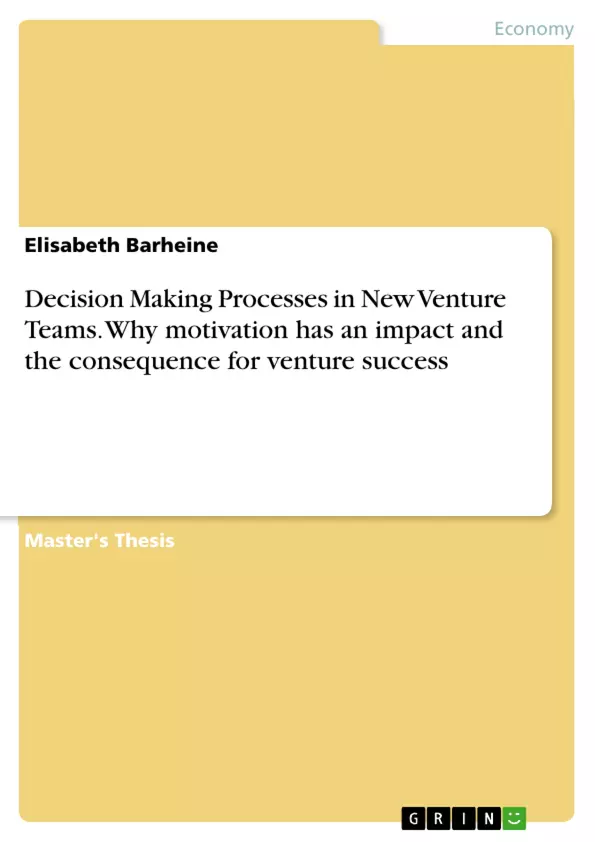In this paper, I propose a triangular relationship between entrepreneurial motivation, decision making and success of new venture teams. Based on longitudinal qualitative case studies of six founder teams of technology ventures, I argue that maximizing wealth and maintaining control are the main motivational drivers for strategic decisions of individuals. However, not the individual motivations per se, but the interplay of individual motivations of all team members have an impact on a venture’s strategic decisions. The study discloses that consistent team alignment regarding motivations over time is related to venture success. The implications of this study are discussed in terms of practical imprints. They suggest that further investigation into new venture team motivation and relation to success and decision making is warranted.
How do founders’ motivations in new venture teams affect strategic decision making and shape decision making between team members over time? How do the outcomes of these team member interactions affect venture success?
To answer these questions, I have employed a qualitative research approach employing grounded theory based on case studies from six ventures. Each team member was interviewed twice with an interval of six months in time difference. The data was then analyzed by applying an inductive coding approach. Based on this, I have discovered four main findings:
First, the main strategic motivations of why founders keep running their ventures are either maximizing wealth or maintaining control. These two motivations have a trade-off relationship. Second, a founder who shows a clear preference towards one of the main strategic motivations has highly aligned personal motifs of why she or he wanted to start founding the venture initially. Third, there are several factors within a team that enable highly aligned strategic motivations between all team members. Fourth, teams who strive for one clear strategic motivation are more successful in achieving their goals than teams with entrepreneurs of mixed motivations.
Inhaltsverzeichnis (Table of Contents)
- 1. Introduction
- 2. Literature Review
- 2.1. New Ventures, New Venture Teams and Context
- 2.2. Decision Making in New Venture Teams
- 2.3. Entrepreneurial Motivations
- 2.4. Venture Performance
- 3. Methodology
- 3.1. Research Design
- 3.2. Data Collection
- 3.3. Coding and Analysis
- 4. Findings
- 4.1. Individual Motivations
- 4.2. Interrelation between strategic motivations and personal motifs
- 4.3. Development of Individual motivations over time
- 4.4. Motivational Orientations within NVTs
- 4.5. Dynamics of Group Orientations and their Effect on Venture Success
- 4.6. Interplay of Individuals, Teams and Ventures
- 5. Discussion and Conclusion
- 5.1. Theoretical and Practical Implications
- 5.2. Limitations, Future Research, and Conclusions
Zielsetzung und Themenschwerpunkte (Objectives and Key Themes)
This paper aims to investigate the relationship between entrepreneurial motivation, decision-making, and the success of new venture teams. Through longitudinal qualitative case studies of six technology venture founder teams, the study seeks to understand the impact of individual and team motivations on strategic decisions and venture outcomes.
- The primary motivational drivers for strategic decisions among individuals in new venture teams.
- The influence of the interplay of individual motivations on a venture's strategic decisions.
- The correlation between consistent team alignment regarding motivations over time and venture success.
- The practical implications of the findings for improving new venture team dynamics and success.
- The need for further research into the connection between new venture team motivation, success, and decision-making.
Zusammenfassung der Kapitel (Chapter Summaries)
The paper begins with an introduction that outlines the research question and framework. Chapter 2 reviews existing literature on new ventures, decision-making, entrepreneurial motivations, and venture performance. Chapter 3 details the methodology employed, including the research design, data collection, and coding and analysis techniques. Chapter 4 presents the findings, examining individual motivations, the interrelation between strategic motivations and personal motifs, the development of individual motivations over time, motivational orientations within new venture teams, the dynamics of group orientations and their effect on venture success, and the interplay of individuals, teams, and ventures.
Schlüsselwörter (Keywords)
The study focuses on the interplay of entrepreneurial motivation, decision-making, and success within new venture teams. It explores the impact of individual and team motivations on strategic decisions, and the importance of consistent team alignment for venture outcomes. Key terms include entrepreneurial motivation, decision-making, new venture teams, strategic decisions, venture success, and team alignment.
- Quote paper
- Elisabeth Barheine (Author), 2020, Decision Making Processes in New Venture Teams. Why motivation has an impact and the consequence for venture success, Munich, GRIN Verlag, https://www.grin.com/document/1438671



